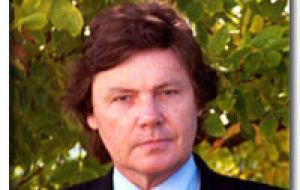MercoPress. South Atlantic News Agency
Re-editing a Falklands war mission in Argentina
 Professor Nigel West.
Professor Nigel West. The author of “The secret war for the Falklands” Nigel West called in Punta Arenas last week and together with local journalists visited the location in southern Chile where in May 1982 a Royal Navy helicopter involved in a failed secret mission had to land and was destroyed.
Nigel West is a renowned author and military historian specializing in intelligence, counterintelligence and security issues and in his famous book revealed details of a British attempt with a SAS group to infiltrate Argentine air bases in Tierra del Fuego and destroy Argentine aircrafts armed with the deadly Exocet missiles for which the Royal Navy's Task Force in the South Atlantic had no countermeasures. According to Punta Arenas leading daily La Prensa Austral, West, currently traveling on the cruise vessel Rotterdam, showed up at the newspaper and asked to be taken to the location where the helicopter landed and was destroyed by the crew in an attempt to leave no traces of its true purpose. West was lucky and had as guide Jose Villaroel who was one of the witnesses at the time of the incident and in half an hour trip they covered the 15 miles to the exact location in Agua Fresca. Not a trace of the helicopter exists but the British historian, according to Villaroel was quite moved since he had written about it and never imagined "it was so close to the sea" and to Punta Arenas. The Sea King HC 4 was flying six commandos whose mission was direct reconnaissance of the Argentine military base at Rio Grande from where the Super Etendart fighter bombers with the deadly Exocet missiles operated, one of which a few days before had sunk the RN destroyer Sheffield, a major setback for the Task Force and a big boost for the Argentine forces. Following the reconnaissance the commandos' objective was to infiltrate the base, kill the pilots and destroy the aircrafts and missiles. What so far ha not been cleared is what really happened, "appalling weather conditions during a routine scouting mission" as reported at the time or engine problems with the chopper, or the team realized they had been detected. "As you can see it was a big operation, but it failed", said West. The helicopter then headed for Chilean territory, the six commandos were landed near Punta Arenas and somehow they contacted with headquarters in Britain (some kind of satellite communications system) and an official from the British Embassy in Santiago flew to Punta Arenas to pick them up. "They were flown to Santiago lodged in a safe place for a couple of weeks and later abandoned Chile as common tourists", said Nigel West. With the three pilots there was not much problem "because walking their way to Punta Arenas they said they were lost". They were later allowed to leave Chile, but not a word was ever heard about the six commandos. "Once I get back to England I'll be able to tell the pilots I visited the place they landed, maybe they are retired but it may make them feel more relaxed", said the intelligence expert. "The secret war for the Falklands" was first published in 1992 and Nigel has promised an updated edition for the 25th anniversary of the conflict. The Argentine version of the incident, according to books on the Malvinas War, with quotes from former Argentine intelligence officers, is that the Rio Grande base was prepared for an action of this kind and furthermore one of the top officers in charge had spent long periods of training with the Royal Marines in Britain.



Top Comments
Disclaimer & comment rulesCommenting for this story is now closed.
If you have a Facebook account, become a fan and comment on our Facebook Page!